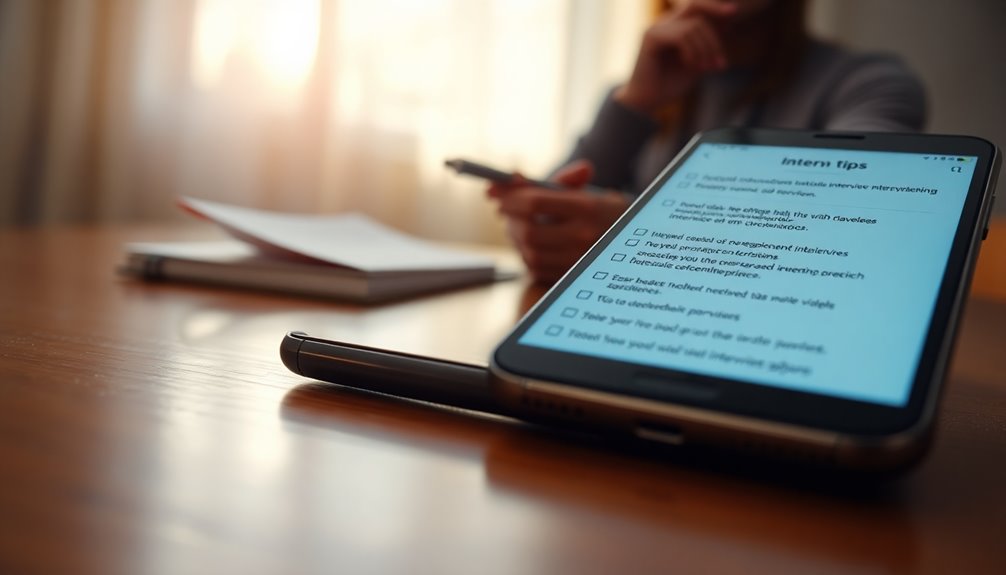Job Interview
Essential Financial Analyst Interview Insights Revealed
The top insights for acing your financial analyst interview are unveiled, but the secrets to truly standing out remain just ahead.

When preparing for a financial analyst interview, focus on showcasing your skills and experiences directly related to financial analysis. Highlight your accomplishments with tools like Excel and any certifications like CFA that validate your expertise. Be ready to discuss your strengths, weaknesses, and career ambitions. Understanding financial analysis methodologies, such as ratio analysis and trend evaluation, is essential. Additionally, effective communication and ethical integrity are key in translating complex data for stakeholders. By mastering these insights, you'll enhance your chances of success in the interview process, and there's more valuable information waiting to help you excel further.
Key Takeaways
- Highlight your motivation for finance and unique qualifications to stand out as a candidate for the financial analyst role.
- Share specific examples of your greatest strengths and weaknesses to demonstrate self-awareness and growth potential.
- Showcase your proficiency in financial analysis tools like Excel and relevant certifications such as CFA to validate your skills.
- Master financial analysis methodologies, including vertical, horizontal, and ratio analysis, to enhance your analytical capabilities.
- Emphasize clear communication of complex data and adherence to ethical principles to build trust with stakeholders and ensure long-term success.
General Interview Questions

In a financial analyst interview, you'll likely encounter several general questions designed to gauge your motivation and unique qualifications for the role.
Be prepared to discuss why you're pursuing this career and what sets you apart from other candidates. You might face questions about your greatest strengths and weaknesses, so think of specific examples to illustrate these traits.
Your interviewer may also ask about your career aspirations beyond the financial analyst position, providing insight into your long-term goals.
It's important to answer honestly and reflectively, as this illustrates your self-awareness and dedication to professional growth.
Employment Goals and Company Fit

Setting clear employment goals is essential for aligning your aspirations with the organization's mission and values. By doing this, you'll not only enhance your interview performance but also demonstrate a genuine interest in the company.
Consider these key aspects when reflecting on your goals:
- Identify how your skills can contribute to the company's objectives.
- Research the company culture to verify it matches your values.
- Define what success looks like for you in this role.
When your personal goals and the company's direction align, you're more likely to thrive and make a meaningful impact.
This alignment also helps you articulate your vision during the interview, showcasing your commitment to becoming a valuable team member.
Experience and Skills Overview

Aligning your employment goals with the company's direction sets the stage for a fruitful career.
In your previous roles, you've likely gained valuable experience that directly relates to financial analysis. Highlight your key accomplishments, such as improving reporting accuracy or streamlining financial processes.
Discuss your proficiency in tools like Excel and financial software, showcasing your ability to create insightful models and forecasts. Certifications such as the CFA can further validate your expertise, demonstrating your commitment to continuous learning.
Emphasize your analytical skills, attention to detail, and effective communication, as these are essential in presenting complex data clearly.
Financial Analysis Methodologies

Financial analysts frequently employ various methodologies to guarantee accurate and insightful analysis. Understanding these approaches is essential for delivering reliable financial assessments.
Here are three key methodologies you should be familiar with:
- Vertical Analysis: This method allows you to evaluate financial statements by comparing individual line items to a base figure, helping you understand proportionate relationships.
- Horizontal Analysis: You can analyze trends over time by examining financial data across multiple periods, revealing growth patterns or inconsistencies.
- Ratio Analysis: This approach assesses the financial health of a company by comparing different financial metrics, enabling you to evaluate liquidity, profitability, and solvency.
Mastering these methodologies will enhance your analytical skills and make you a more effective financial analyst.
In-depth Analysis Techniques

In-depth analysis techniques are essential for financial analysts aiming to provide thorough insights into a company's performance. By utilizing methods like ratio analysis, trend analysis, and variance analysis, you can uncover valuable information that drives strategic decisions.
Here's a comparison of these techniques:
| Technique | Purpose | Key Metric |
|---|---|---|
| Ratio Analysis | Assess financial health | Debt-to-Equity Ratio |
| Trend Analysis | Identify patterns over time | Revenue Growth Rate |
| Variance Analysis | Compare budget vs. actual | Budget Variance Percentage |
Mastering these techniques will enhance your ability to evaluate a company's strengths and weaknesses, ultimately improving your analytical skills and supporting informed decision-making.
Cash Flow and Loan Considerations

Understanding cash flow and loan considerations is essential for making sound financial decisions. Effective cash flow management guarantees you have enough liquidity to meet obligations, while loans can provide necessary capital for growth.
When evaluating cash flow and loans, consider the following key factors:
- Loan terms and interest rates: Understand the costs associated with borrowing.
- Impact on cash flow: Assess how loan repayments will affect your available cash.
- Timely collections: Ascertain receivables are collected promptly to maintain positive cash flow.
Essential Analyst Skills

Managing cash flow effectively sets the foundation for a financial analyst's success.
You'll need strong analytical skills to interpret financial data and derive actionable insights. Proficiency in financial modeling and forecasting is essential, as it helps you predict future financial performance.
Being able to communicate complex financial information clearly guarantees that stakeholders grasp essential insights. Attention to detail is non-negotiable; even minor errors can lead to significant financial consequences.
Familiarity with software tools like Excel, SAP, or Oracle enables you to automate processes and enhance reporting efficiency. Additionally, data visualization skills are important for presenting findings in an engaging manner.
Developing these skills will position you as a valuable asset in any financial analysis role.
Behavioral Interview Strategies

Behavioral interview strategies are essential for effectively showcasing your skills and experiences during an interview. By using the STAR method—Situation, Task, Action, Result—you can provide structured responses that highlight your capabilities.
Here are a few strategies to contemplate:
- Prepare specific examples: Think of instances where you demonstrated key skills relevant to the financial analyst role.
- Focus on outcomes: Emphasize the positive results of your actions to show your impact.
- Practice articulating your stories: Rehearse your responses to convey confidence and clarity.
Communication and Conflict Resolution

Effective communication and conflict resolution are essential skills for financial analysts, as they often need to convey complex information clearly and collaborate with diverse teams.
You'll face disagreements with coworkers, but how you handle these situations matters. Focus on resolution strategies, emphasizing collaboration over conflict.
Active listening is key; it helps you understand different perspectives and fosters an environment of trust.
When presenting financial data, use storytelling techniques to engage your audience and clarify your points.
Being transparent and approachable encourages open dialogue, making it easier to address misunderstandings. Maintaining emotional alignment during conflicts can also enhance team dynamics and foster a more productive work environment.
Compliance and Ethical Standards

Compliance and ethical standards are essential in the finance industry, playing an important role in maintaining trust and integrity.
As a financial analyst, you need to embrace these principles to foster a culture of accountability within your organization. Upholding high standards not only protects you but also enhances your company's reputation.
Here are key areas to focus on:
- Transparency: Always provide clear and accurate information in your reports.
- Integrity: Make decisions based on ethical principles, even when faced with pressure.
- Regulatory Knowledge: Stay updated on laws and regulations to guarantee compliance in all financial practices.
Frequently Asked Questions
How Do You Prioritize Tasks in a Fast-Paced Environment?
When you're in a fast-paced environment, prioritizing tasks starts with evaluating urgency and importance.
You can use tools like to-do lists or project management software to keep track. Break down projects into smaller steps, tackling high-impact tasks first.
Stay flexible and ready to adjust as new priorities arise. Regularly communicate with your team to guarantee everyone's aligned, and don't hesitate to delegate when necessary to maintain efficiency.
What Role Does Teamwork Play in Financial Analysis?
When it comes to teamwork in financial analysis, you know it's crucial to keep everyone on the same page.
After all, many hands make light work. Collaborating with colleagues allows you to share insights, brainstorm solutions, and guarantee thorough analysis.
By leveraging diverse perspectives, you enhance decision-making and foster a culture of accountability.
Plus, effective teamwork leads to more accurate reporting, making sure that financial strategies align with organizational goals.
How Do You Handle Tight Deadlines?
When you face tight deadlines, prioritize tasks by urgency and importance.
Break projects into manageable steps and set clear milestones to track your progress.
Stay organized using tools like to-do lists or project management software.
Communicate openly with your team about challenges, and don't hesitate to ask for help if needed.
Finally, maintain a positive mindset; it helps you stay focused and efficient, ensuring you meet your deadlines without compromising quality.
Describe Your Approach to Continuous Learning in Finance
Your approach to continuous learning in finance should focus on staying updated with industry trends and advancements.
You can subscribe to financial journals, attend webinars, and participate in workshops. Engaging with online courses and earning certifications can further enhance your skills.
Networking with professionals in the field helps you gain insights and share knowledge.
Make it a habit to reflect on what you learn and apply that knowledge to your work.
What Tools Do You Use for Data Visualization?
When it comes to data visualization, you rely on tools like Tableau and Power BI.
These platforms help you create interactive dashboards that make complex data easy to understand.
You often use Excel for simpler visualizations, like charts and graphs, to support your findings.
Conclusion
As you prepare for your financial analyst interview, remember that standing out is like being a lighthouse in a stormy sea. By showcasing your unique qualifications, mastering financial methodologies, and employing the STAR method for behavioral questions, you'll illuminate your strengths. Emphasizing your communication skills and understanding of ethical standards will further solidify your candidacy. With these insights in hand, you'll navigate the interview process with confidence and poise, making a lasting impression on potential employers.
Eugene brings a fresh, dynamic voice to our platform as one of our talented Writers. Specializing in research-driven content, he explores the latest findings in psychology and personal growth, translating them into actionable insights for our readers. Eugene’s work is fueled by a curiosity about what makes us tick and a desire to help others unlock their potential.
Job Interview
The One Interview Question That Trips Everyone Up—Except You!
The key to mastering the trickiest interview question lies in your unique approach—discover how to turn the tables in your favor!

The question "Tell me about yourself" often trips candidates up, but you've got the advantage. Start with a concise elevator pitch that highlights your strengths and recent relevant experiences. Share a specific challenge you've faced and what you learned, showcasing your problem-solving skills. Remember to align your response with the company's values for added impact. Being self-aware and demonstrating growth from past experiences can set you apart. Approach this staple question with confidence, and you'll not only ease your nerves but also impress your interviewer. Keep going to discover more strategies for mastering the interview process!
Key Takeaways
- Craft a concise elevator pitch that highlights your key strengths and relevant experiences to answer the common interview opener effectively.
- Use storytelling techniques to create engaging responses that connect your background to the job and the company's culture.
- Practice articulating your experiences and challenges to demonstrate self-awareness and resilience, making your answer memorable.
- Research the company's values and mission to tailor your response, showcasing your commitment and fit within the organization.
- Prepare for potential follow-up questions to maintain confidence and clarity, ensuring a smooth continuation of the conversation.
Understanding the Question

Understanding the question "Tell me about yourself" is essential for a successful interview. This question often kicks off the conversation, and how you respond can set the tone for the entire interview. Many job candidates struggle with it, leading to lengthy or unfocused answers that can overshadow their qualifications. Instead of rambling, aim for a concise response lasting 1-2 minutes.
When answering this question, remember that interviewers use it to gauge your confidence, self-awareness, and communication skills. They want to see how well you can articulate your experiences and strengths in relation to the job. A well-crafted answer should highlight key strengths and relevant experiences tailored to the role and company culture.
This is your chance to make a strong first impression, so consider what aspects of your background align with what the employer values. Reflect on your previous roles, achievements, and the skills that set you apart. Being prepared to answer this question effectively can greatly enhance your chances of moving forward in the interview process, showcasing your potential as a strong candidate. Additionally, showcasing skills relevant to AI online jobs can further demonstrate your adaptability in a rapidly changing job market.
Framing Your Response

Crafting a focused response to the "Tell me about yourself" question can greatly impact your interview performance. To answer this question effectively, you should concentrate on your strengths and relevant experiences that align with the role. Keep your response structured and concise, ideally lasting 1-2 minutes.
Consider these key elements when framing your response:
- Highlight a recent challenge: Discuss how you tackled it and the lessons learned, showcasing your problem-solving skills.
- Tailor your answer: Emphasize experiences that demonstrate your culture fit and the specific skills sought by the employer.
- Engage with anecdotes: Share brief stories that connect your background to the job, illustrating your enthusiasm and qualifications.
- Emphasize resilience: Drawing on experiences, such as navigating a divorce process, can showcase your ability to overcome personal challenges and adapt to new circumstances.
Showcasing Self-Awareness

While self-awareness might seem like a soft skill, it plays a critical role in how you present yourself during interviews. Employers value candidates who can reflect on their strengths and weaknesses, showcasing maturity. When you're faced with interview questions about your weaknesses, don't shy away. Instead, discuss them openly and highlight the steps you've taken for personal growth. This approach shows your commitment to improving yourself.
To further demonstrate self-awareness, share specific examples of past challenges you've faced and the lessons learned. This not only highlights your resilience but also your adaptability in professional settings. Interviewers appreciate candidates who can articulate these experiences clearly, as it enhances your communication skills and keeps the conversation engaging.
Moreover, be prepared to discuss how your co-workers perceive you. Responses that align with the job requirements can greatly strengthen your position. By articulating your self-awareness, you create a powerful impression that you're not only aware of your capabilities but also actively working on your development. This level of insight can set you apart and make you a memorable candidate in the eyes of interviewers. Additionally, practicing techniques such as nighttime meditation can help improve your focus and reduce anxiety before the interview, further enhancing your performance.
Strategies for Improvement

To enhance your interview performance, focus on developing targeted strategies that highlight your strengths and align with the job's requirements. When faced with tricky interview questions, such as those about leaving your last job, you want to respond confidently and clearly. Here are some effective strategies for improvement:
- Craft a concise elevator pitch that emphasizes your key strengths and experiences relevant to the position.
- Utilize storytelling techniques to create engaging narratives that showcase your skills and make your responses memorable.
- Research the company's culture and values to tailor your answers, demonstrating your understanding of their mission and goals. Additionally, practicing in front of small groups can help you develop your public speaking skills, making you more articulate during interviews.
Aligning With Company Values

Understanding and aligning with company values can greatly enhance your interview success. When candidates resonate with an organization's mission, they're 30% more likely to stay engaged and committed to their roles. Researching a company's core values before an interview gives you insights into its culture, allowing you to tailor your responses effectively.
Demonstrating how your personal values align with the company's is essential. Prepare specific examples that showcase your commitment and fit, as this can help you navigate interview questions that trip many candidates up. Companies that prioritize value alignment report 25% higher employee satisfaction, indicating that understanding these values improves your job fit and team cohesion.
Additionally, don't overlook the importance of diversity and inclusion. Many organizations actively seek candidates who support these initiatives, so make sure to highlight your understanding and commitment to these core values. By aligning with company values, you not only increase your chances of impressing interviewers but also position yourself as a well-rounded candidate who truly cares about the organization's mission. Furthermore, demonstrating a knowledge of diverse investment options can show your ability to adapt and thrive in various environments, reflecting a mindset that aligns well with innovative companies.
Frequently Asked Questions
What Is the Most Common Interview Question That Trips People Up?
The most common interview question that trips you up is "Tell me about yourself." It's open-ended, and many candidates struggle to keep their responses concise and relevant. Instead of getting lost in personal stories, focus on crafting a succinct elevator pitch that highlights your strengths and relevant experiences. This sets a positive tone for the interview and showcases your confidence, self-awareness, and communication skills, which are essential for making a great first impression.
What Is the Most Dreaded Interview Question?
You sit down, heart racing, and then it hits you—"Tell me about yourself." It's the question that sends chills down every candidate's spine. You know it's coming, yet you can't help but feel unprepared. To tackle it, you've gotta craft a concise narrative that highlights your strengths and experiences. Focus on what aligns with the job, and remember, it's your chance to shine. You've got this; just keep it clear and engaging!
What Is the Hardest Interview Question to Answer?
The hardest interview question to answer often revolves around "Tell me about yourself." You need to condense your personal and professional journey into a brief, compelling narrative that aligns with the job. It's essential to highlight your strengths and experiences while making a strong first impression. Many candidates struggle with this because they either ramble or fail to connect their background to the role, leaving interviewers wanting more clarity and relevance.
What Are Top 5 Behavioral Interview Questions?
Imagine stepping onto a stage, spotlight shining bright, as you face the top five behavioral interview questions. You'll likely encounter: "Describe a time you faced a significant challenge," "How did you work on a team?" "Tell me about handling a difficult customer," "Can you discuss a situation where you demonstrated leadership?" and "What's an example of resolving conflict?" Prepare your stories; they'll showcase your skills and experiences vividly.
Conclusion
So, as you stride into that interview, armed with your witty retorts and dazzling charm, remember: the dreaded question isn't a dragon to slay, but a quirky puppy waiting for a belly rub. Embrace it! Showcase your self-awareness like it's your new designer handbag, and align your answers with the company's values as if you're auditioning for a role in a corporate rom-com. With this mindset, you won't just survive; you'll waltz out with the job!
Felicity, our Author, pens in-depth articles and guides that delve into the heart of personal discovery. Her narrative-driven approach weaves together theory, practice, and personal anecdotes, making the journey of self-exploration both relatable and inspiring. Felicity’s contributions help illuminate the path for those seeking a deeper understanding of themselves and their relationships.
Job Interview
Unlocking Job Opportunities: Your Discovery Story
Get ready to uncover the secrets of your personal discovery story and learn how it can transform your job search journey.

Revealing job opportunities starts with your personal discovery story. You need to identify what motivates you; this self-awareness helps align you with the right company culture. Craft your response to clearly communicate why you're drawn to the role and how your skills match the job requirements. Show genuine enthusiasm for the company's mission and highlight your potential for growth. Leverage your connections for insights and referrals, as these can provide a competitive edge. By focusing on these elements, you can effectively showcase your strengths and fit for the position. Keep exploring to uncover more strategies for success.
Key Takeaways
- Reflect on personal motivations to clearly express why you're drawn to specific job opportunities.
- Utilize connections for insights about company culture and job roles to inform your application.
- Engage in networking events to expand professional relationships and discover hidden job opportunities.
- Craft tailored responses that highlight relevant skills and experiences aligned with job descriptions.
- Show genuine enthusiasm for the organization's mission and projects to stand out as a candidate.
Understanding Your Motivation

Understanding your motivation is essential when exploring job opportunities. When you identify what drives you, you can make informed decisions that align with your career goals.
Reflect on why you're drawn to a specific role or company; this self-awareness can highlight your internal connections with the organization. Employers want to know your reasons for applying, as this reveals your fit with their culture and values.
Additionally, consider how you discovered the job posting; internal referrals can give you a competitive edge and offer insight into the company from someone who knows it well.
Crafting Your Response

When preparing your response to the question about your interest in a position, think of it as a chance to spotlight your qualifications.
Start by clearly articulating what draws you to the role and the company. Mention specific aspects of the job description that resonate with your skills and experiences.
Be honest about how you discovered the position, whether through a referral, job board, or career page. Highlight your relevant qualifications and how they align with the company's goals.
This isn't just about your past; it's also about how you envision contributing to the team. Keep your answer concise and focused, showcasing your fit for the role while laying the groundwork for discussing your enthusiasm later.
Showcasing Your Enthusiasm

Showcasing your enthusiasm for a position can greatly impact how potential employers perceive your fit for the role. When you express genuine interest, you demonstrate your commitment to the company's mission and values.
Start by sharing specific reasons why you're excited about the role, such as unique projects or the company culture. Highlight your alignment with their goals and mention any research you've conducted about the organization.
Discuss how you see yourself growing within the company and contributing to its success. This not only shows you're informed but also passionate about the opportunity. Additionally, expressing your enthusiasm aligns with the Law of Attraction principles, which emphasize that positive energy can attract positive outcomes.
Finally, let your personality shine through; authentic enthusiasm can leave a lasting impression and set you apart from other candidates.
Leveraging Your Connections

Leveraging your connections can greatly enhance your chances of landing a job. Your network is a valuable resource, and tapping into it can provide insights and opportunities you mightn't find on your own.
Here are some effective ways to utilize your connections:
- Reach out to friends or colleagues working at your target company.
- Ask for informational interviews to learn more about the company culture.
- Utilize LinkedIn to connect with employees in your field.
- Attend industry events or networking meetups to expand your circle.
- Seek referrals from connections who believe in your skills.
Real-Life Response Examples

Drawing on real-life examples can considerably enhance your ability to answer the common interview question about how you found the job. Here are some scenarios you might consider sharing:
| Source of Discovery | Relationship/Context | Key Highlights |
|---|---|---|
| Employee Referral | Friend from college | "They believed I'd fit well." |
| Online Job Posting | Company's careers page | "The projects align with my skills." |
| Recruiter Connection | Past collaboration | "They knew my experience well." |
| Networking Event | Industry conference | "I was impressed by the company culture." |
These examples not only illustrate your journey but also demonstrate your enthusiasm and fit for the role. Tailor your response to reflect your unique experiences!
Frequently Asked Questions
How Do I Tailor My Answer for Different Company Cultures?
To tailor your answer for different company cultures, start by researching each company's values and mission. Identify what resonates with you and align your response to reflect that.
Use specific examples that showcase your fit within their culture, such as teamwork or innovation. Highlight experiences that illustrate your adaptability.
Finally, express genuine enthusiasm for how you can contribute to their unique environment, making sure your tone matches their workplace vibe.
What if I Found the Job Posting Through Social Media?
Finding a job posting through social media is like discovering a hidden gem in a vast treasure chest.
You've stumbled upon an opportunity that resonates with your skills and passions.
When you mention this in an interview, highlight your excitement about the role and how the company's values align with yours.
Share what drew you in on social media, and emphasize your enthusiasm for being part of their team!
Can I Mention Multiple Sources Where I Discovered the Job?
Yes, you can mention multiple sources where you discovered the job. Highlighting various avenues shows your proactive approach and genuine interest in the position.
For instance, if you found the job through social media, a referral, and the company's website, share those details. This not only demonstrates your enthusiasm but also reflects your thorough research about the company.
Just be honest and concise in your response to keep it engaging.
Is It Important to Mention Any Negative Aspects of the Company?
Sure, it's not a great idea to bring up negative aspects of the company during your interview. You want to keep the vibe positive, right?
Instead, focus on what excites you about the role and the company culture. If you've done your homework, you'll find plenty of positives to discuss.
This way, you present yourself as someone who's genuinely interested and ready to contribute to the team's success.
How Can I Follow up After Applying for the Position?
After applying for a position, you should follow up within a week or two.
Send a brief, polite email expressing your continued interest and inquiring about the status of your application. Keep it professional and concise.
If you have a connection within the company, consider reaching out to them for insights. This shows initiative and enthusiasm, making you stand out among other candidates.
Conclusion
In closing, your discovery story is more than just a way to share how you found a job; it's a chance to connect your journey with the company's mission, to showcase your passion for the role, and to highlight the relationships that brought you here. Embrace this opportunity to share your unique narrative, to express your enthusiasm, and to demonstrate your fit. Remember, your story can open doors and set you apart in a competitive job market.
Eugene brings a fresh, dynamic voice to our platform as one of our talented Writers. Specializing in research-driven content, he explores the latest findings in psychology and personal growth, translating them into actionable insights for our readers. Eugene’s work is fueled by a curiosity about what makes us tick and a desire to help others unlock their potential.
Job Interview
Master Your Phone Interview: Essential Tips Inside
Prepare to ace your phone interview with essential tips that could set you apart from the competition; discover what you need to know inside.

To master your phone interview, start by understanding its importance as a screening tool for recruiters. Prepare thoughtfully by researching the company culture and setting up a quiet, distraction-free space. Practice concise, engaging responses to common questions and maintain a positive tone throughout. Active listening is key—take notes and ask for clarifications when needed. Don't forget to follow up with a thank-you message that reiterates your enthusiasm. These strategies can boost your chances of a successful interview. Keep going to uncover additional tips that can elevate your performance even further.
Key Takeaways
- Research the company culture to tailor your responses and align with their values during the interview.
- Designate a quiet, distraction-free space to conduct the interview professionally.
- Prepare a list of insightful questions to ask the interviewer, showcasing your genuine interest.
- Practice active listening and take notes to engage effectively and clarify any doubts.
- Send a personalized thank-you message post-interview to express appreciation and reinforce your qualifications.
Understanding Phone Interviews

When it comes to phone interviews, you need to recognize their role as essential screening tools for recruiters. These interviews help assess whether you're a good fit for the job requirements and eliminate candidates who don't meet the criteria.
Typically, they serve as preliminary assessments, so expect questions that reflect your application content. Success in these interviews can pave the way for in-person meetings, making them a vital step in your job search.
Keep in mind that recruiters are looking for candidates who not only meet the qualifications but also demonstrate professionalism, a positive personality, and strong communication skills.
Approach your phone interview with this understanding, and you'll enhance your chances of moving forward in the hiring process.
Effective Preparation Strategies

To boost your chances of success in a phone interview, effective preparation strategies are key. Start by researching the company and its culture, so you can tailor your responses accordingly.
Designate a quiet, distraction-free area for the interview to create a professional atmosphere. Have your resume, a list of insightful questions, and notes on common interview questions ready for reference.
Practice your professional greeting, and maintain an upright posture to convey confidence. Rehearse your responses, focusing on clarity and relevance.
Finally, anticipate what the interviewer might ask, so you're not caught off guard. With these strategies, you'll set yourself up for a successful phone interview and increase your chances of moving to the next stage.
Communication Techniques for Success

Effective communication is essential for success in a phone interview, as it helps convey your enthusiasm and qualifications to the recruiter.
Focus on your tone; it should reflect engagement and positivity. Keep your responses concise, hitting the key points that relate to the job.
Practice active listening by taking notes and asking clarifying questions without interrupting. This shows you're attentive and interested.
Use bullet points in your notes for a seamless flow in your dialogue, ensuring you don't sound scripted. Tailor your answers to align with the job description, prioritizing relevant information. Additionally, demonstrating strong communication skills can significantly enhance your rapport with the interviewer.
Navigating Common Interview Questions

Steering through common interview questions can feel intimidating, but preparation is key to mastering this challenge. Start by anticipating questions like "Tell me about yourself" and "Why do you want to leave your current job?" Craft concise, engaging responses that showcase your qualifications and experiences.
Structure your answers to highlight relevant skills and achievements, making certain they align with the job description. Practice your responses to guarantee they flow naturally, without sounding scripted.
Remember to keep your answers focused and to the point, avoiding lengthy narratives. This allows you to convey enthusiasm and confidence.
Finally, don't hesitate to ask the interviewer for clarification on any questions—you'll show that you're engaged and enthusiastic to provide the best response possible.
Utilizing Behavioral Insights

Utilizing behavioral insights during phone interviews can markedly enhance your chances of success. Focus on the STAR method to structure your responses: explain the Situation, Task, Action, and Result of your past experiences. This technique allows you to demonstrate your problem-solving skills and adaptability effectively.
When answering behavioral questions, choose examples that showcase your strengths relevant to the job you're applying for. It's also essential to actively listen and engage with the interviewer, asking clarifying questions to show your interest and understanding.
Tailor your stories to align with the company's values and the role's requirements, making it clear how your past experiences have prepared you for this opportunity. This approach will leave a lasting impression on the recruiter.
Follow-Up and Etiquette

Following a phone interview, timely follow-up and proper etiquette can greatly impact your chances of moving forward in the hiring process.
Send a thank-you message within 24 hours, expressing your appreciation for the opportunity and reiterating your enthusiasm for the position. Keep it brief, but make sure to personalize it by mentioning something specific from your conversation.
Additionally, inquire about the next steps to show your continued interest. This not only reinforces your qualifications but also keeps you on the recruiter's radar.
Enhancing Your Interview Performance

To enhance your interview performance, focus on a few key areas that can considerably impact the outcome. Here are four essential strategies:
- Research the Company: Understand its culture, values, and recent news to tailor your responses effectively.
- Prepare Your Environment: Choose a quiet, distraction-free space for the interview to project professionalism.
- Practice Active Listening: Engage with the interviewer by listening attentively and asking clarifying questions to demonstrate your interest.
- Use the STAR Method: Structure responses to behavioral questions by describing the Situation, Task, Action, and Result to illustrate your qualifications clearly. Additionally, consider professional mediation if conflicts arise during the interview process to maintain a positive dialogue.
Frequently Asked Questions
What Should I Wear During a Phone Interview?
During a phone interview, it's smart to dress as if you're meeting in person.
Wearing professional attire not only boosts your confidence but also sets the right mindset. Choose something comfortable yet polished, like a button-up shirt or blouse, even if the interviewer can't see you.
This way, you'll feel more professional and engaged. Remember, your demeanor matters, and dressing well can positively influence your performance during the call.
How Long Do Phone Interviews Typically Last?
Phone interviews typically last between 20 to 40 minutes.
You'll want to be concise yet thorough in your responses, as time is limited. Make sure you structure your answers effectively and stay focused on key points.
This timeframe allows recruiters to assess your fit while giving you a chance to showcase your qualifications.
Can I Have Notes in Front of Me?
Yes, you can have notes in front of you during a phone interview.
It's actually a great idea to prepare a few key points, like your resume, questions to ask, and responses to common questions.
Just make sure to keep your notes organized and concise so you can refer to them smoothly.
This helps you stay focused and confident while demonstrating your preparedness to the interviewer.
What if I Miss the Call From the Recruiter?
Missing a call from a recruiter can feel like a missed opportunity, but it doesn't have to be the end of the road.
If you miss the call, don't panic. Reach out promptly, expressing your interest and apologizing for the inconvenience. A quick and professional follow-up can demonstrate your commitment.
How Can I Handle Nervousness During the Interview?
Nervousness during an interview's normal, but you can manage it. Start by taking deep breaths to calm your nerves before the call.
Remind yourself that it's a conversation, not an interrogation. Practice your responses to common questions to feel more prepared.
Visualize success, and maintain a positive mindset. If you stumble, pause, gather your thoughts, and continue.
Focus on your qualifications and the opportunity, rather than your anxiety.
Conclusion
Mastering your phone interview is like tuning an instrument before a concert; the right preparation guarantees you hit all the right notes. Just as a musician practices to stay in harmony, you can enhance your confidence and clarity through thoughtful preparation and practice. Remember, every detail counts—your enthusiasm, your responses, and even your environment. With these tips, you'll be ready to impress and take center stage in your job search. Keep practicing, and soon, you'll be playing your own success symphony!
Eugene brings a fresh, dynamic voice to our platform as one of our talented Writers. Specializing in research-driven content, he explores the latest findings in psychology and personal growth, translating them into actionable insights for our readers. Eugene’s work is fueled by a curiosity about what makes us tick and a desire to help others unlock their potential.
-

 Love Compatibility between Zodiac Signs2 months ago
Love Compatibility between Zodiac Signs2 months agoRat Compatibility in the Chinese Zodiac: Which Signs Are the Perfect Match?
-

 Love Compatibility between Zodiac Signs3 months ago
Love Compatibility between Zodiac Signs3 months agoThe Ultimate Guide to Throuple Zodiac Compatibility
-

 Love Compatibility between Zodiac Signs2 months ago
Love Compatibility between Zodiac Signs2 months agoCat Zodiac Compatibility: Which Signs Are Most Compatible With Cats?
-

 Love Compatibility between Zodiac Signs3 months ago
Love Compatibility between Zodiac Signs3 months ago10 Mother-Daughter Zodiac Combinations That Have Natural Compatibility
-

 Love Compatibility between Zodiac Signs2 months ago
Love Compatibility between Zodiac Signs2 months agoHow to Assess Snake Compatibility in the Chinese Zodiac
-

 Love Compatibility between Zodiac Signs1 month ago
Love Compatibility between Zodiac Signs1 month agoDiscover Your Family's Zodiac Compatibility With This Calculator
-

 Love Compatibility between Zodiac Signs1 month ago
Love Compatibility between Zodiac Signs1 month agoChinese Zodiac Compatibility: How Does the 1957 Year of the Rooster Interact With Other Signs?
-

 Love Compatibility between Zodiac Signs3 months ago
Love Compatibility between Zodiac Signs3 months agoOctober 22 Zodiac Compatibility: Who Is the Perfect Match for Your Sign?




















